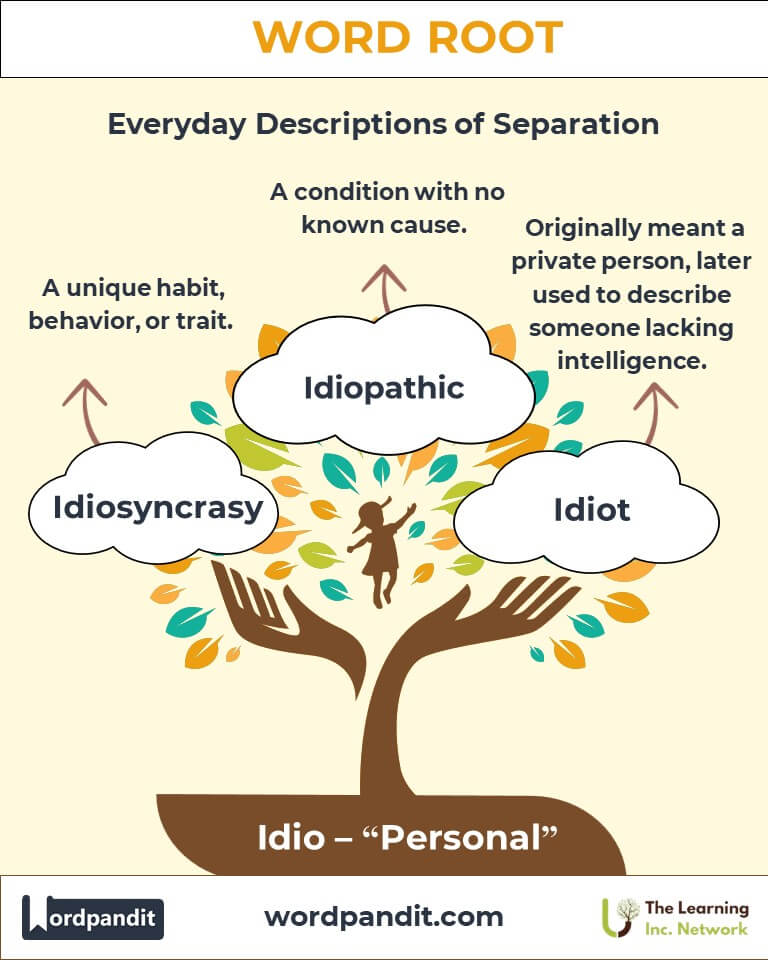Idio: The Root of Individuality and Peculiarity in Language
Discover the essence of the root idio, derived from Greek, meaning “personal” or “peculiar.” From intriguing terms like idiosyncrasy to widely used expressions like idiom, this root celebrates the uniqueness and peculiarities of individuals and language alike.
Table of Contents
- Introduction: The Essence of Idio
- Etymology and Historical Journey
- Mnemonic: Unlocking the Power of Idio
- Common Idio-Related Terms
- Idio Through Time
- Idio in Specialized Fields
- Illustrative Story: Idio in Action
- Cultural Significance of Idio
- The Idio Family Tree
- FAQs About the agr Word Root
- Test Your Knowledge: agr Word Root Quiz
- Conclusion: The Living Legacy of Idio
Introduction: The Essence of Idio
What makes us unique? The Greek root idio (pronounced “id-ee-oh”) holds the answer. Meaning “personal” or “peculiar,” idio celebrates individuality and singularity. From psychological traits to cultural expressions, this root underscores how distinctiveness shapes both human behavior and language.
Words like idiosyncrasy (a peculiar habit or trait) and idiom (a unique linguistic expression) highlight how idio adds richness to our understanding of personal and cultural identity.

Etymology and Historical Journey
The root idio originates from the Greek word idios, meaning "one’s own" or "private." In ancient Greece, it described what was individual or distinct, often in contrast to what was common or shared. Over time, idio became foundational in words that reflect personal characteristics, unique expressions, or specific traits.
As Latin borrowed the root, terms like idiota (meaning an uneducated or private person) arose, eventually giving way to modern English words like "idiot," which shifted to describe someone lacking common sense—a far cry from its original neutral meaning.
Mnemonic: Unlocking the Power of Idio
Picture a person holding a brightly colored umbrella in a sea of plain ones—standing out as unique and peculiar. This image captures the essence of idio: individuality amidst the ordinary.
Mnemonic Device: “Idio stands for individuality—your own peculiar identity.”
Common Idio-Related Terms
- Idiosyncrasy (id-ee-oh-sin-kruh-see): A unique habit, behavior, or trait.
Example: "Her habit of twirling her hair was just one of her charming idiosyncrasies."
- Idiom (id-ee-uhm): A phrase or expression with a meaning not directly inferred from its words.
Example: "The idiom 'break the ice' means to initiate a conversation."
- Idiolect (id-ee-oh-lekt): An individual’s unique way of speaking.
Example: "Her idiolect was full of regional expressions and personal quirks."
- Idiopathic (id-ee-oh-path-ik): Relating to a condition with no known cause.
Example: "The doctor described his persistent symptoms as idiopathic."
- Idiot (id-ee-uht): Originally meaning a private person or layman, it later came to mean someone lacking intelligence.
Example: "In ancient Athens, an 'idiot' was simply someone uninvolved in public affairs."
Idio Through Time
- Idiot (Ancient to Modern):
Once a neutral term for private individuals, it evolved into a derogatory description of limited intelligence during the Middle Ages.
- Idiom (Linguistic Evolution):
Initially referring to a dialect or language peculiar to a group, it now signifies expressions unique to a culture or region.
Idio in Specialized Fields
- Medicine:
Idiopathic: Describes conditions without identifiable causes.
Example: "Idiopathic epilepsy affects patients with no clear genetic or environmental triggers."
- Linguistics:
Idiolect: Captures the distinct speech patterns of individuals.
Example: "Every idiolect reflects personal history and cultural influences."
- Psychology:
Idiosyncrasy: Highlights personal traits or behaviors unique to an individual.
Example: "Understanding idiosyncrasies can improve interpersonal relationships."
Illustrative Story: Idio in Action
Lila, a linguist, had always been fascinated by idioms. While traveling in Japan, she learned the phrase "猿も木から落ちる" (Even monkeys fall from trees), meaning that even experts can make mistakes. This encounter led her to study how idioms reflect cultural values. Along the way, she documented unique idiolects, discovering how personal speech patterns preserve history and individuality. Through her journey, idio became the bridge connecting language, culture, and personal identity.
Cultural Significance of Idio
The idio root emphasizes individuality and creativity across cultures. Idioms encapsulate collective wisdom, while idiosyncrasies celebrate personal quirks. Together, they reflect humanity’s rich tapestry of diversity, highlighting how peculiarities can be both personal and universal.

The Idio Family Tree
- Auto (self):
- Autonomous: Self-governing or independent.
- Autograph: A person’s own signature.
- Ego (self, identity):
- Egotistic: Self-centered or selfish.
- Egoism: The practice of valuing oneself above others.
- Uni (one):
- Unique: One of a kind.
- Unilateral: Affecting only one side.

FAQs About the "Idio" Word Root
Q: What does the root "idio" mean?
A: The root "idio" comes from the Greek word idios, meaning "personal" or "peculiar." It emphasizes individuality, distinctiveness, or characteristics that belong to a specific person or thing.
Q: What is an idiolect, and why is it significant?
A: An idiolect is an individual’s unique way of speaking, including their choice of words, tone, and grammatical structures. It reflects personal experiences, cultural background, and even emotional states, making language a deeply personal form of expression.
Q: How does the word "idiom" connect to the root "idio"?
A: Idioms are phrases or expressions with meanings that cannot be deduced from the literal meanings of their words. The connection to "idio" lies in their peculiarity—they are unique to specific cultures or groups and reflect collective creativity.
Q: Why does the word "idiot" derive from "idio"?
A: In ancient Greece, the term idiotes referred to someone who focused solely on private matters and avoided public affairs. Over time, the word took on a more negative connotation, evolving to mean someone lacking knowledge or understanding.
Q: What does idiopathic mean in medical terms?
A: In medicine, "idiopathic" refers to a condition with no identifiable cause. It is derived from "idio" (personal or peculiar) and "pathos" (disease), emphasizing that the illness is unique to the individual without an apparent origin.
Q: Are idiosyncrasies always unusual or negative?
A: Not at all. Idiosyncrasies simply refer to traits or habits that are unique to an individual. While they can seem odd, they often add charm or character, making someone memorable or distinctive.
Q: How are idioms and idiolects different?
A: Idioms are fixed expressions peculiar to a group or culture, such as "kick the bucket" meaning "to die." In contrast, idiolects are unique linguistic patterns specific to an individual, reflecting personal language habits.
Test Your Knowledge: Idio Word Root Quiz
1. What does the root "idio" signify?
2. Which term refers to a person’s unique speech?
3. What does idiopathic mean?
4. Which term describes a cultural expression?
5. What did the term "idiot" originally mean?
Conclusion: The Living Legacy of Idio
The root idio reminds us of the beauty in individuality and peculiarity. From idioms that capture cultural wisdom to idiosyncrasies that define personal charm, idio enriches language and human interaction. As we celebrate uniqueness, this root continues to inspire exploration of what makes us distinct yet connected.














